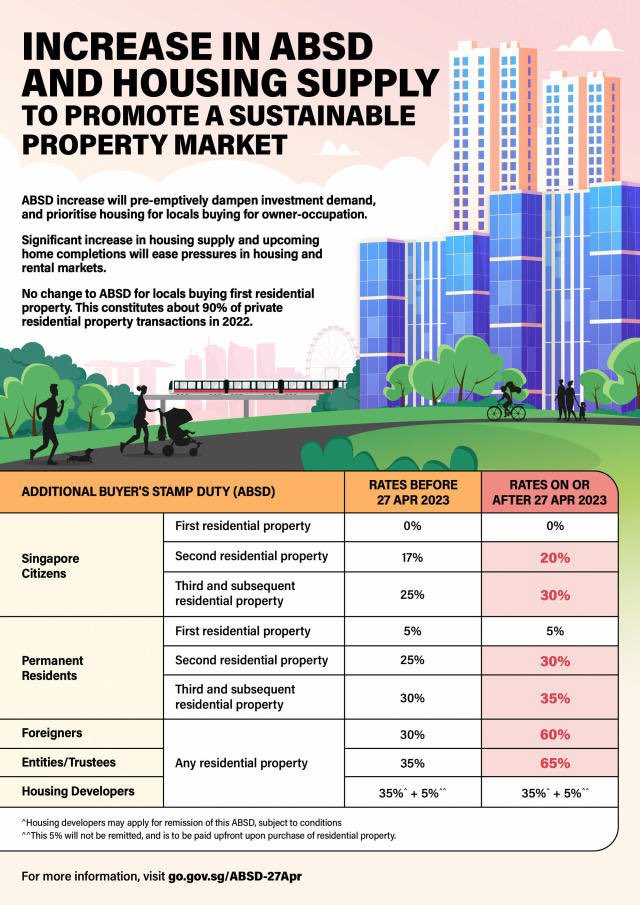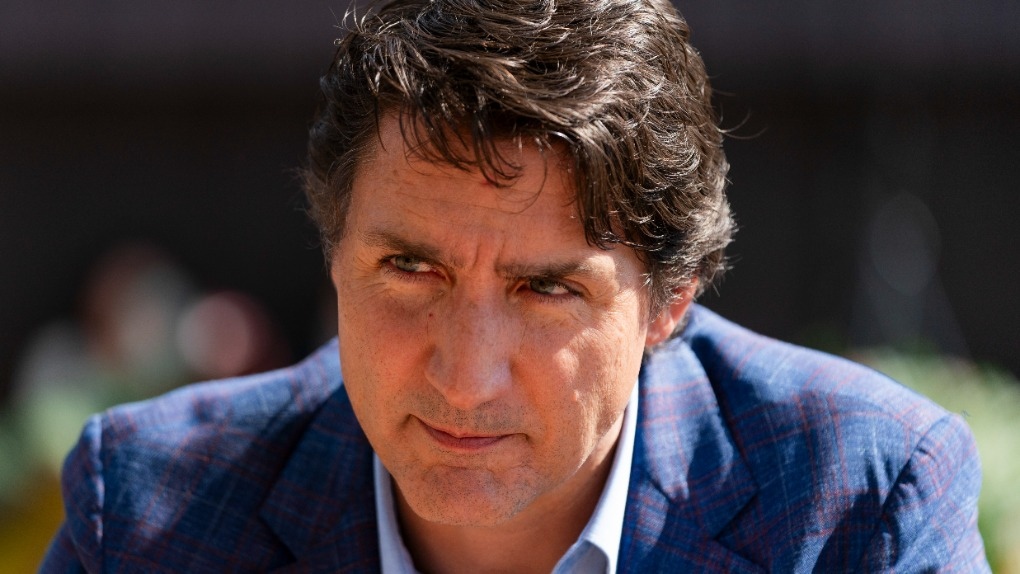The prime minister is meeting with his youth advisory board this week to hear its most ‘pressing concerns,’ with the aim of informing future policy decisions.

Implement a Singapore housing tax and you’ll get my vote:


Hey that’s not fair, it would hurt the pockets of those who own Trudeau. He means ideas that won’t amount to any change. Duh lol.

For the lazy https://www.mnd.gov.sg/newsroom/press-releases/view/measures-for-a-sustainable-property-market
Seems reasonable to me, just glad i’m not a land-lord; wish i knew what the taxes were on.

Sincere question: how would this help renters? It seems to me that this would discourage people from buying investment properties to rent out, and increase the supply available to buyers. While this would make it cheaper to buy, it seems like it would make it more expensive to rent, unless one or more of the following is true:
- A significant number of units are sitting empty, owned by speculators, rather than being rented. out (plausible, but I haven’t seen proof - is there any?)
- Landlords are colluding to keep prices high (unlikely given that there are hundreds of thousands of independent landlords per StatsCan)
- For some reason besides collusion, free-market pricing is otherwise inapplicable to rent prices (why could this be?)
If you or anyone else would kindly shed some light on this for me, I would gladly join your cause. As it stands, I’m currently more of an advocate for building public housing to increase the supply of both rental and purchase units, rather than adjusting the bias of what units we already have towards ownership over rentals.

Someone buying an investment property doesn’t increase the amount of housing available. Sure, it’s one more rental available, but it’s also one less home available to be purchased by someone planning to live in it. I won’t claim to be any kind of expert, but it’s pretty obvious that it having a middle man extracting profit increases housing costs overall.
The type of investors that do increase housing are developers. In the tax model above, the developers can apply to have the tax reduced to 5% which seems to make it much more lucrative than buying individual houses to rent as is.

If they don’t increase the amount of housing, then they don’t decrease it either, right? They effectively move a house that would be bought by a home buyer, to a house that would be rented by a renter.
I can see how given the argument that landlords generally make profit, that they are a needless middleman, and therefore they contribute to higher housing costs. Is there any evidence that this impact is so substantial that regulating independent landlords will be a boon for consumers of housing?
I appreciate you sharing your perspective! I remain open to be informed as to how such a policy would help the housing crisis.

Yes. The evidence is the housing market in 2023. Tax domestic speculators. Regulate the hell out of them. They are the main reason that everything is so screwed.

“the housing market in 2023”
Could you explain what you mean by that? I’d like to understand more but that’s a very broad statement.
Obviously the housing market is bad for buyers and renters currently. How can we differentiate between the primary cause being independent landlords, and there being insufficient supply? Both would have the effect of high prices, right? Therefore, more evidence is required to be persuasive.
Again, I remain open to being convinced, and once convinced would gladly be a staunch advocate for your position! My apologies if I’m missing something obvious. I really am sincerely trying to understand the argument for taxing independent landlords as a solution to our housing crisis.
- EhForumUser ( @EhForumUser@lemmy.ca ) 2•10 months ago
It appears the average Singaporean home was $1.2MM in March, $1.6MM in June, and $2MM as of a week ago. I’m surprised he hasn’t adopted it already!

Housing would be nice, but how about electoral reform?
Or, you know, fucking actually do something instead of endless committees, boards, surveys and studies. You know what you need to to:
- Build housing directly (like, employ people, buy land and buy equipment, don’t subcontract)
- Tightly regulate the market
- Tax the rich to pay for it …but you won’t do it because it would cost your donor class money.
I’m sick of this. This government didn’t need a study when they bought a pipeline for Alberta, and they didn’t need a study to buy fridges for Galen Weston. They only need studies when they don’t want to do something.
Want a model of what to do? Look at Doug Ford. That corrupt mobster-wannabee just straight up sold government land for pennies on the dollar and netted his daughter’s wedding guests billions. Did he have a committee or a study? Nope, just git’r’done.
Holy shit, you’re the goverment. You can print money. You can even claim all sorts of Keynesian multipliers as to why it’s worth doing. Just fucking do it.

I’m still very bitter about the broken electoral reform promise.

My kids will never move out. My neighbor just built a bunkie from a kit in preparation of his kid never being able to move out in this batcrap market.
Build as much housing as you possibly can.
Now, you may be reading that as “build a lot of housing”. But that’s not what was written.
Build as much housing as you possibly can.
/RonSwanson
Seriously, if you’re not considering the feasibility of putting sheds on the moving roof of the sky dome, you’re not taking this seriously enough. If you’re not considering tearing apart a million-dollar MRI machine for scrap metal for roofing, you’re not taking this seriously enough. I want you to take the NIMBYs, flay them, tan the skins, and use them to make tents for homeless people.

A politician pretending to give a fuck again. What else is new?
- argv_minus_one ( @argv_minus_one@beehaw.org ) 7•10 months ago
Trudeau seeking advice from youth on how to make them shut up and stop making a fuss so he can get back to selling Canada out to his billionaire buddies.
Fixed that for you.

If you think Trudeau sells out to his rich buddies just wait until Milhouse stumbles his way into office
This is the best summary I could come up with:
The prime minister is meeting with his youth advisory board this week to hear its most “pressing concerns,” with the aim of informing future policy decisions.
It is the first in-person meeting of this cohort of the Prime Minister’s Youth Council; its new members have been in place since February of this year.
“The Youth Council plays a crucial role as a fundamental platform for the Prime Minister, Members of Parliament and senior government officials to consult and gather insights, as well as for youth to share their perspectives, priorities and ideas,” reads a government press release about the meeting.
“The Youth Council discussions are expected to offer valuable insights that will inform future policy decisions,” it also states.
He also highlighted what the government has done so far to try to address the economic challenges many young people are facing, such as offering ways to save up to buy a home and eliminating interest on student loans, but Trudeau also noted “there’s lots more to do.”
“Every time I sit down with the members of my youth council, I am endlessly inspired by their fresh ideas and perspectives,” Trudeau said in a release Monday.
The original article contains 407 words, the summary contains 195 words. Saved 52%. I’m a bot and I’m open source!

A combination of a few million new high density housing over the next decade, a complete rewrite of zoning laws to take them outside of the hands of the cities, and the removal of any need of any neighbourhood association to sign off on any new development.
Commercial producers won’t make housing cheap and affordable on their own in any reasonable time-frame. Even if they instantly become able to construct as they like, market forces will take time to let housing prices cool off.
Which goes into my second point, zoning laws as they exist prevent housing from being made in the first place. Especially single family house zones are the single biggest killer of affordable housing. People already make their houses massive, to the point that they’re getting close to low-rise apartments.
Which goes to the third point: the character of a neighbourhood changes every single day, so any attempt at the preservation of such a thing is just a bald faced lie, even if they’re lying to themselves saying it. The neighbourhood I grew up in were all small houses, from tiny two stories to bungalows. Every single house is easily twice if not three times bigger than the ones I remember as a child. There’s no trace of the neighbourhood I grew up in, aside from the fact that they don’t house any more families than before. Hell, they probably house fewer people than before as I bet almost all the families there have only one child at most.
The unfortunate result if there was actually the political will to do this is that it would cause a pretty big depression as people have been conditioned into treating housing as an investment for their retirement. A necessity of modern life being used to create profit, that in itself is a non-performing asset that adds exactly zero dollars to the economy and is worse than buying a whole bunch of gold ingots in the hopes that its value will rise faster than inflation.
Personally, I’m patient so I’m fine with house prices going down slowly, as long as rentals get cheaper. It’s stupid when such a high number of young decide that they’re pushing off moving out of their homes due to seeing it impossible to afford one of their own. Delaying getting a home, even an apartment, means delaying getting married, presuming you’re even bothering to date. Delayed marriages means fewer children, which means a stagnating and eventually dwindling population.
If the population stagnates, then everything falls apart for the elderly as the price of everything goes up as there’s fewer people to make, deliver, and serve everyday items. And that’s not to mention that the entire RRSP system depends on sufficient new blood putting money into it just to maintain the status quo. Lots of retirees all over the world are going back to work only because inflation has gone up a bit. How many will do so when it becomes impossible to keep inflation in the most critical areas down due to the lack of workers?
In the end, housing is the root problem, and while I fear it causing a major recession, I still think it’s preferable than for housing prices to never come down. The economy will tank in the future whether the housing bubble bursts or keeps its course. But only one of those two options gives us a hopeful future beyond that bleak one.

Electoral reform should be number one priority. Once that’s fixed then housing as electoral reform would help resolve a lot of this issues in our current system.

